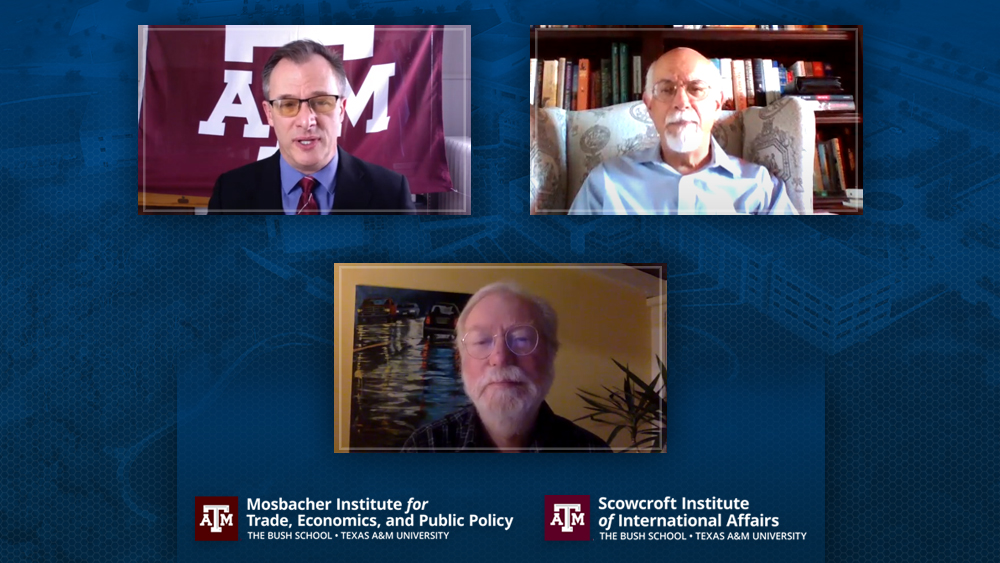
On Tuesday, February 22, the Mosbacher Institute for Trade, Economics, and Public Policy and the Scowcroft Institute of International Affairs at the Bush School of Government and Public Service at Texas A&M University hosted Sir Paul Collier for a virtual discussion.
Collier is a Professor of Economics and Public Policy at the Blavatnik School of Government at the University of Oxford. He also serves as a Director of the International Growth Centre and the ESRC research network, Social Macroeconomics. His research covers the transformation from poverty to prosperity, state fragility, the implications of group psychology for development, migration and refugees, urbanization in poor countries, and the crisis in modern capitalism. Collier’s most recent book, Greed is Dead, with John Kay, was published in July 2020. Sir Paul Collier received a knighthood in 2014 for services promoting research and policy change in Africa and has been listed as one of the hundred most influential public thinkers.
Speaking on major themes from one of his books, The Future of Capitalism: Facing the New Anxieties, Collier identified the two major societal divides that are shaping the global conversation around the future of capitalism. Countries are now divided between booming metropoles and the hinterlands as well as the highly educated and those with manual labor skills. Drawing from both personal experience and his extensive career in economics, Collier connects how these societal divergences have made two camps of extremes: those who champion unregulated capitalism and those who want to throw out capitalism altogether. Collier argues that we must work our way back towards the center, harnessing the “wonderful system” of capitalism with good public policy to keep it from derailing.
With great historical illustration, Collier detailed how capitalism has derailed three times and has been corrected twice. When the industrial revolution sprung out of England in the 1840s, the industrial cities were not prepared for the stress that migration for increased labor would put on public health infrastructure. When life expectancy dramatically dropped in factory towns at a time when productivity was increasing, individuals both with and without much power identified their individual obligations to the public and created systems that benefited society as a whole. The second derailment of capitalism came during the Great Depression and was corrected with the programs and growth of the WWII era. The third derailment started in the 1980s with the rise of economic individualism and the demand for individual rights without individual obligations, which Collier said must be addressed by scholars, policy-makers, and citizens today.
Today, Collier asserted, individual rights are demanded while obligations to fulfill those demands are placed entirely on the state, creating an impossible task for governments. Capitalism is at its best when each person is morally load-bearing, realizing that they have to take responsibility for their own lives and those around them. At the moment, however, some subsects of society are so far behind that they cannot effectively contribute. The challenge to correct capitalism this time will be to rebuild the middle section of society between the individual and the government: civil society. It is not enough for a society of individuals to work for money for capitalism to succeed. Collier stressed they must also work together to achieve worthwhile goals. The COVID-19 pandemic has been a litmus test of sorts for how well countries can do this as some countries have pulled together to save their health and economy while others have polarized and suffered.
During the Q&A, Collier concluded by encouraging the audience to forge a common purpose through dialogue to rebuild the intellectual center. His advice to everyone, but especially students and young people, is to work at what you want to do, and not necessarily what you want to be, to enact the most change.
Watch The Future of Capitalism with Sir Paul Collier on the Bush School YouTube channel.

